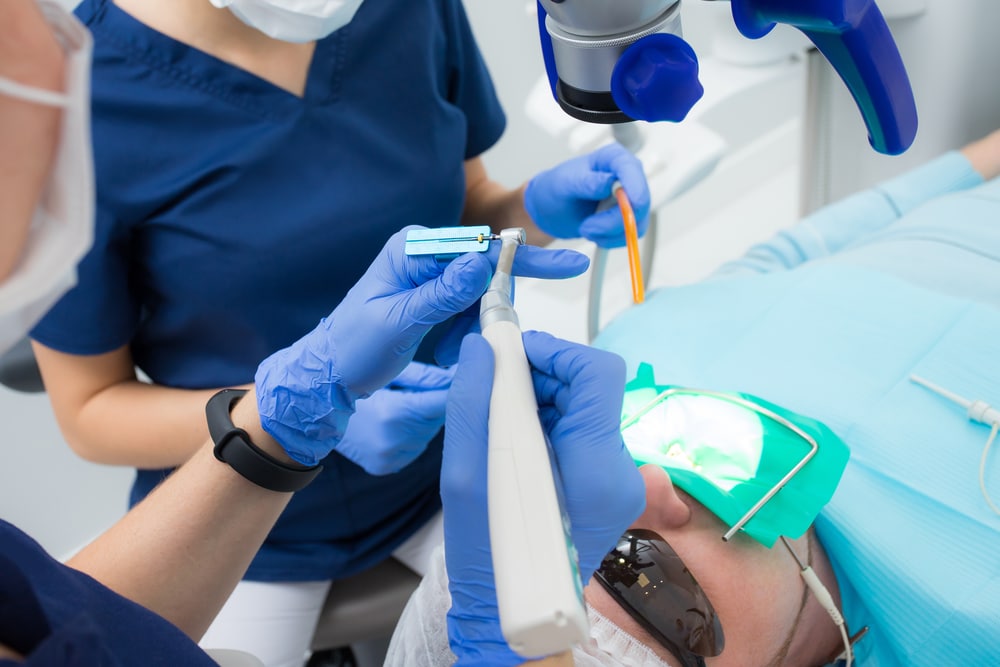There are many different treatment options out there designed to preserve your natural teeth and to keep them in good condition. One such treatment is endodontic surgery. While many cases of tooth decay can be treated by your dentist, others require endodontic surgery in order to preserve your natural tooth.
Endodontic surgery is typically used as a last resort in order to save a tooth that has not responded to other treatment methods. Your dentist and endodontist will generally try to use other treatments to save your natural tooth, such as root canal therapy and endodontic retreatment, prior to making the jump to endodontic surgery.
What Is Endodontic Surgery?

Endodontic surgery is a type of surgery in your mouth. It can be used in many different ways, from diagnosing an issue that won’t show up on X-rays to treating damaged teeth. If you need endodontic surgery, it is because your endodontist needs to do this treatment in order to treat the issue and save your natural tooth.
With modern medicine and the continued advancement of technology, there’s no need to worry about pain with this type of surgery. It is usually able to be performed very quickly and successfully, with anesthesia that numbs the area. Most people are able to resume their normal daily activities the day following the procedure and only experience mild levels of post-operative discomfort.
Are There Alternatives To Endodontic Surgery?
If your endodontist has recommended that you get endodontic surgery, it is because your tooth isn’t responding to other treatment methods. The alternative to endodontic surgery is tooth extraction. While artificial tooth replacements have come a long way, nothing beats your natural tooth. That’s why endodontists will do everything in their power in order to save your natural tooth, including surgery, before they make that jump to tooth extraction.
If needed, implants, dentures, and bridges can replace your damaged tooth. However, the most cost-effective way to preserve your oral health is to do your best to maintain your natural teeth and to keep them in good condition. If you need a tooth extraction, you need a tooth extraction, and thankfully there are artificial teeth options available to help restore your chewing function and to keep your other teeth from shifting. But in general, your endodontist will do everything in their power to preserve your natural teeth.
Endodontic surgery may sound scary, but it could be just what you need in order to keep your natural tooth.
What Is Endodontic Surgery Used For?

This type of surgery is used for a variety of purposes. Some common types of surgical procedures include:
- Apicoectomy. This is also called a root end resection. This is the most common type of endodontic surgery. If you have a tooth that isn’t responding to root canal therapy or endodontic retreatment, an apicoectomy can save it. This removes infected tissue, as well as the tips of your roots. It is commonly performed if someone is still experiencing infection or inflammation after having a root canal.
- Removal of calcium deposits. This type of surgery may be needed if you have calcium deposits that make it so that your endodontist can’t easily perform a root canal. It is needed so that the root canal can be done.
- Diagnosis. Sometimes, you may be experiencing pain in your mouth, but nothing shows up on the X-rays. In cases like this, surgery may be needed in order to diagnose the issue. This can happen with problems such as fractures in your tooth or its root. Once diagnosed, you’ll be able to receive the treatment you need.
- Treatment of damaged root surfaces. If your roots are damaged, or the surrounding bone is damaged, then surgery may be necessary to treat the problem.
There are a few other types of less common endodontic surgeries. These include: dividing your tooth in half, removing a root, or intentional replantation, which is when your tooth is extracted, repaired, and then implanted back into its socket.

No matter the reason, this type of surgery is always used in order to save your natural tooth. With the use of anesthetics, it is typically a comfortable procedure. Some discomfort is expected after any surgery, endodontic included. Your endodontist will give you post-op instructions to follow that will help you recover and to alleviate any discomfort you experience.
David G. Johnson, DDS. provides endodontic surgeries. We’re here to save your natural teeth and to do whatever it takes to help you maintain good oral health. Contact us today to learn more.


